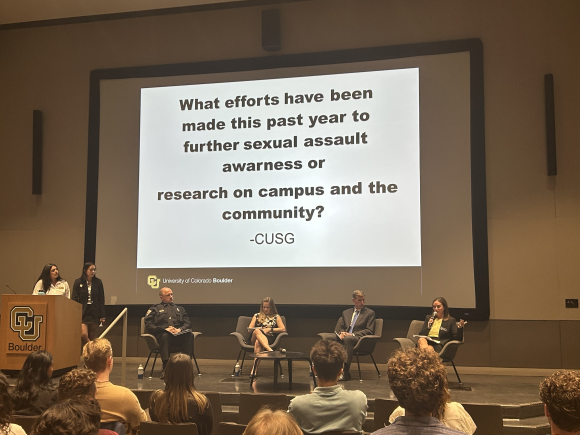
Jess Rampersaud and Lucie Nguyen facilitate a panel with Commander Eric Edford, Jessica Ladd-Webert, District Attorney Michael Dougherty, and Llen Pomeroy in the Chancellor’s Hall on April 24, 2023. (Ann Marie Vanderveen/CU Independent)
For Sexual Assault Awareness Month, the University of Colorado Boulder Student Government (CUSG) facilitated a sexual assault awareness panel at the Center for Academic Success and Engagement on Monday, April 24.
The panelists included Boulder County District Attorney Michael Dougherty, CU Boulder Police Department Commander Eric Edford, Office of Victim Assistance Director Jessica Ladd-Webert and Office of Institutional Equity and Compliance (OIEC) Associate Vice Chancellor and Title IX Coordinator Llen Pomeroy.
The panel was facilitated by CUSG’s Student Affairs Tri-Executive Lucie Nguyen and Intern Director Jess Rampersaud.
The discussion began with a question submitted by the Presidents Leadership Class: “How can transparency around sexual assault reporting be improved?”
In response, Pomeroy said the university community, especially the student body, deserves transparency about sexual assault statistics. The university has a responsibility to inform students about trends, such as an increase in cases.
The most recent sexual misconduct survey administered by the university in 2021 found a decrease in instances of sexual misconduct but an increase in the severity of assaults.
“[If] we are seeing an increased number of cases and we are handling cases, either formally or informally, we have a responsibility to share publicly and transparently with all of you,” Pomeroy said.
However, Pomeroy said that OIEC has an obligation to protect identities, so details about specific cases can’t be discussed or released.
The next question, submitted to the panel by CUSG, asked what efforts have been made on campus to increase sexual assault awareness and research.
Ladd-Webert mentioned the new Sexual Misconduct Task Force announced in August 2022, an initiative intended to expand prevention efforts on campus.
“We know that sexual misconduct and sexual assault is a society-wide problem that’s happening here on our campus,” Ladd-Webert said.
“I know other people on this panel probably have other goals, [such as] wanting to see an increase in reporting, but I want to see an increase in support for survivors [on campus],” she said.
In terms of legislation, Dougherty said that he has seen a lot of improvements in how the justice system supports victims of sexual assault.
“[But] the fact that you’re here just shows that there’s more work to be done,” he said, addressing the audience.
Dougherty then discussed a recent amendment to Colorado law, HB22-1169, from 2022. This amendment incorporated the word “consent” into the definition of sexual assault. He described the previous definition as “complicated” and potentially confusing to jurors in sexual assault cases. This law now describes sexual assault as“when the actor causes sexual intrusion or sexual penetration knowing the victim does not consent.”
Edford said survivors who choose to come to law enforcement have more autonomy in deciding how they want to proceed. He said there isn’t necessarily a need for immediate action when talking with law enforcement.
“Trauma takes time to process,” Edford said.
Dougherty added that going to a hospital and getting a medical forensic exam following a sexual assault does not trigger a report in Colorado if the victim is over 18.
Then, the panel moved on to questions submitted by the audience. One question related to the recruitment of a football player at CU Boulder with a history of sexual misconduct allegations. The audience member did not mention the player by name, but the university recently confirmed that a player accused of sexual assault has left the football team.
“How is CU ensuring that what we’re saying aligns with what we’re doing?” the audience member asked.
Pomeroy reiterated that privacy laws protecting student records prevent the university from speaking directly about any specific cases.
“The purview of the university’s sexual misconduct policy does not apply to a time at which the person was not a member of our campus community,” she said.
Pomeroy said any disclosure of sexual misconduct violations in a student’s application to CU Boulder may affect their admission decision or restrict their ability to be involved in certain parts of campus life. She said risk evaluation of a certain individual can be conducted if information comes to light following their admission.
“Students should use their voice, and I am excited that students do want to use their voice when they have concerns about how things are handled,” Ladd-Webert said.
Through this panel, CUSG aimed to connect students with university and local officials and facilitate discussions about what is being done to address sexual assault in the Boulder community.
“This event is about raising sexual assault awareness for the students,” Nguyen said. “We’re very fortunate that [CUSG] has those connections for the students.”
Contact CU Independent Staff Writer Ann Marie Vanderveen at ann.vanderveen@colorado.edu.
